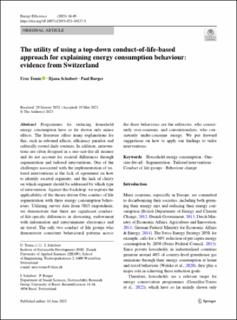Please use this identifier to cite or link to this item:
https://doi.org/10.21256/zhaw-28087Full metadata record
| DC Field | Value | Language |
|---|---|---|
| dc.contributor.author | Tomic, Uros | - |
| dc.contributor.author | Schubert, Iljana | - |
| dc.contributor.author | Burger, Paul | - |
| dc.date.accessioned | 2023-06-16T14:21:03Z | - |
| dc.date.available | 2023-06-16T14:21:03Z | - |
| dc.date.issued | 2023-06-14 | - |
| dc.identifier.issn | 1570-646X | de_CH |
| dc.identifier.issn | 1570-6478 | de_CH |
| dc.identifier.uri | https://digitalcollection.zhaw.ch/handle/11475/28087 | - |
| dc.description | Erworben im Rahmen der Schweizer Nationallizenzen (http://www.nationallizenzen.ch) | de_CH |
| dc.description.abstract | Programmes for reducing household energy consumption have so far shown only minor effects. The literature offers many explanations for this, such as rebound effects, efficiency paradox and culturally rooted daily routines. In addition, interventions are often designed in a one-size-fits-all manner and do not account for societal differences through segmentation and tailored interventions. One of the challenges associated with the implementation of tailored interventions is the lack of agreement on how to identify societal segments, and the lack of clarity on which segment should be addressed by which type of intervention. Against this backdrop, we explore the applicability of the theory-driven Otte conduct of life segmentation with three energy consumption behaviours. Utilizing survey data from 5015 respondents, we demonstrate that there are significant conduct-of-life-specific differences in showering, endowment with information and entertainment electronics and air travel. The only two conduct of life groups who demonstrate consistent behavioural patterns across the three behaviours are the reflexives, who consistently over-consume, and conventionalists, who consistently under-consume energy. We put forward suggestions on how to apply our findings to tailor interventions. | de_CH |
| dc.language.iso | en | de_CH |
| dc.publisher | Springer | de_CH |
| dc.relation.ispartof | Energy Efficiency | de_CH |
| dc.rights | https://creativecommons.org/licenses/by/4.0/ | de_CH |
| dc.subject | Household energy consumption | de_CH |
| dc.subject | One-size-fits-all | de_CH |
| dc.subject | Segmentation | de_CH |
| dc.subject | Tailored intervention | de_CH |
| dc.subject | Conduct of life group | de_CH |
| dc.subject | Behaviour change | de_CH |
| dc.subject.ddc | 150: Psychologie | de_CH |
| dc.subject.ddc | 333.79: Energie | de_CH |
| dc.title | The utility of using a top-down conduct-of-life-based approach for explaining energy consumption behaviour : evidence from Switzerland | de_CH |
| dc.type | Beitrag in wissenschaftlicher Zeitschrift | de_CH |
| dcterms.type | Text | de_CH |
| zhaw.departement | School of Engineering | de_CH |
| zhaw.organisationalunit | Institut für Nachhaltige Entwicklung (INE) | de_CH |
| dc.identifier.doi | 10.1007/s12053-023-10127-3 | de_CH |
| dc.identifier.doi | 10.21256/zhaw-28087 | - |
| zhaw.funding.eu | No | de_CH |
| zhaw.issue | 5 | de_CH |
| zhaw.originated.zhaw | Yes | de_CH |
| zhaw.pages.start | 49 | de_CH |
| zhaw.publication.status | publishedVersion | de_CH |
| zhaw.volume | 16 | de_CH |
| zhaw.publication.review | Peer review (Publikation) | de_CH |
| zhaw.webfeed | Nachhaltigkeitskommunikation | de_CH |
| zhaw.funding.zhaw | SCCER CREST | de_CH |
| zhaw.author.additional | No | de_CH |
| zhaw.display.portrait | Yes | de_CH |
| Appears in collections: | Publikationen School of Engineering | |
Files in This Item:
| File | Description | Size | Format | |
|---|---|---|---|---|
| 2023_Tomic-etal_Explaining-energy-consumption-behaviour.pdf | 897.81 kB | Adobe PDF |  View/Open |
Show simple item record
Tomic, U., Schubert, I., & Burger, P. (2023). The utility of using a top-down conduct-of-life-based approach for explaining energy consumption behaviour : evidence from Switzerland. Energy Efficiency, 16(5), 49. https://doi.org/10.1007/s12053-023-10127-3
Tomic, U., Schubert, I. and Burger, P. (2023) ‘The utility of using a top-down conduct-of-life-based approach for explaining energy consumption behaviour : evidence from Switzerland’, Energy Efficiency, 16(5), p. 49. Available at: https://doi.org/10.1007/s12053-023-10127-3.
U. Tomic, I. Schubert, and P. Burger, “The utility of using a top-down conduct-of-life-based approach for explaining energy consumption behaviour : evidence from Switzerland,” Energy Efficiency, vol. 16, no. 5, p. 49, Jun. 2023, doi: 10.1007/s12053-023-10127-3.
TOMIC, Uros, Iljana SCHUBERT und Paul BURGER, 2023. The utility of using a top-down conduct-of-life-based approach for explaining energy consumption behaviour : evidence from Switzerland. Energy Efficiency. 14 Juni 2023. Bd. 16, Nr. 5, S. 49. DOI 10.1007/s12053-023-10127-3
Tomic, Uros, Iljana Schubert, and Paul Burger. 2023. “The Utility of Using a Top-down Conduct-of-Life-Based Approach for Explaining Energy Consumption Behaviour : Evidence from Switzerland.” Energy Efficiency 16 (5): 49. https://doi.org/10.1007/s12053-023-10127-3.
Tomic, Uros, et al. “The Utility of Using a Top-down Conduct-of-Life-Based Approach for Explaining Energy Consumption Behaviour : Evidence from Switzerland.” Energy Efficiency, vol. 16, no. 5, June 2023, p. 49, https://doi.org/10.1007/s12053-023-10127-3.
Items in DSpace are protected by copyright, with all rights reserved, unless otherwise indicated.